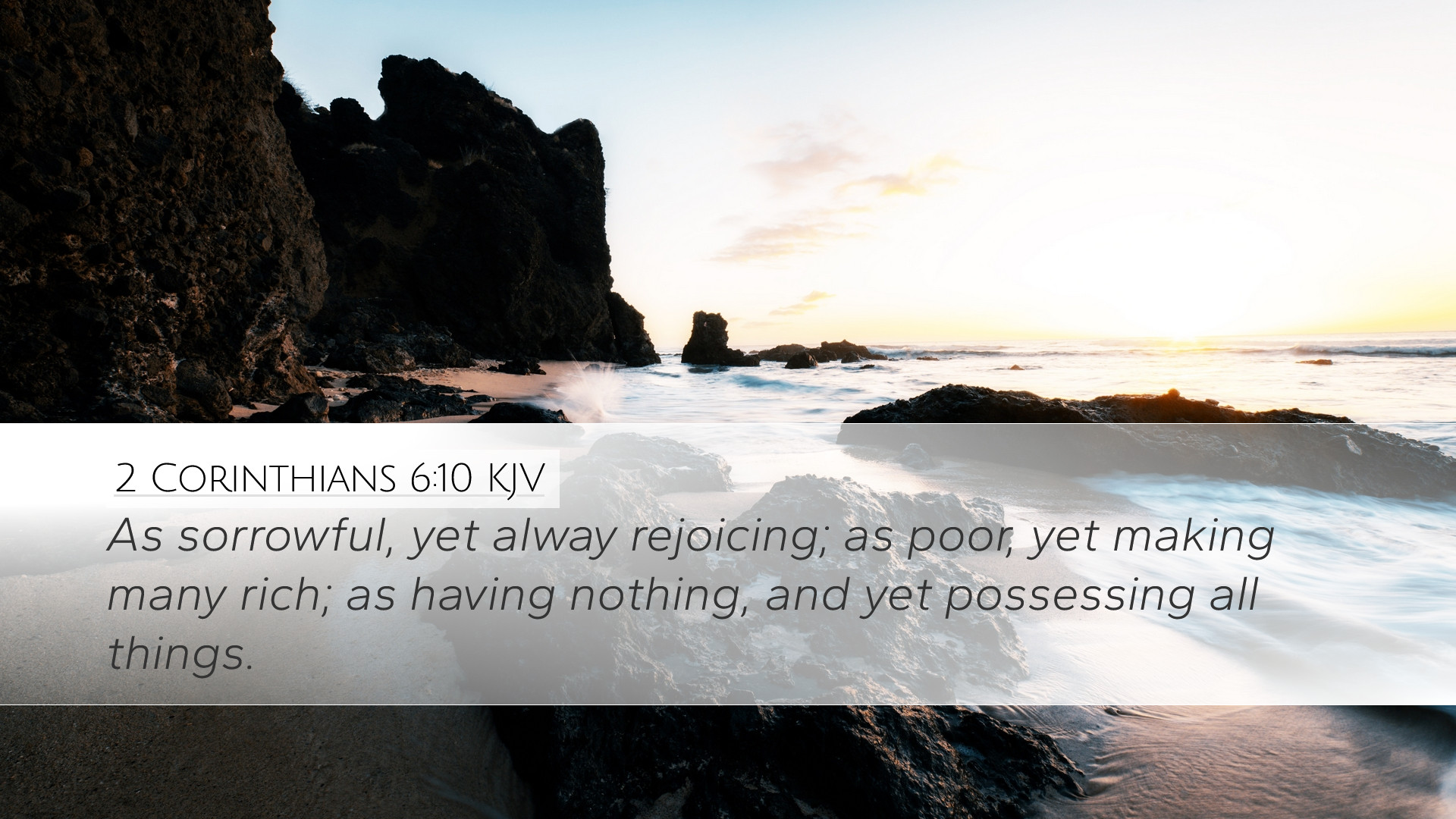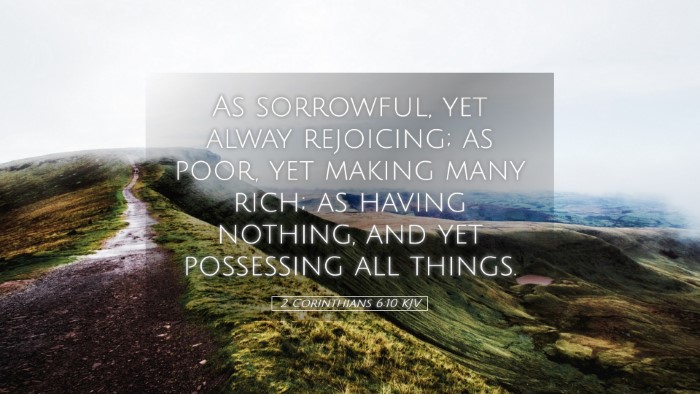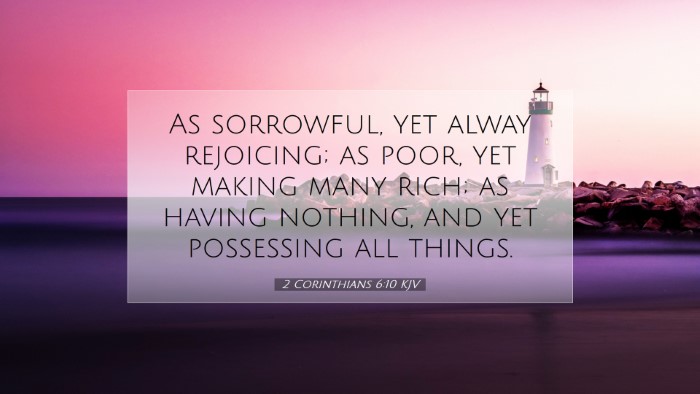2 Corinthians 6:10 Commentary
Verse: "As sorrowful, yet always rejoicing; as poor, yet making many rich; as having nothing, and yet possessing all things." (2 Corinthians 6:10, KJV)
Introduction
This verse encapsulates the paradoxical nature of the Christian experience as articulated by the Apostle Paul. It provides profound insights into the apostolic ministry and the broader spiritual truths that resonate deeply with believers across generations.
Exegesis of the Text
In this passage, Paul employs contrasting images to convey the tension between external circumstances and internal spiritual realities. The juxtaposition of sorrow and joy, poverty and richness, and having nothing yet possessing all things, reflects the heart of the Christian experience.
Insights from Matthew Henry
Joy in Sorrow: Henry emphasizes the notion of joy interwoven with grief. He notes that true Christian joy is not contingent upon earthly circumstances but finds its source in God. This joy persists even amid trials, a theme prevalent throughout Paul's writings.
Spiritual Wealth: According to Henry, while Paul describes himself as 'poor,' he emphasizes the 'richness' he brings to others through the Gospel. This points to a central theme of Christian ministry: the ability to enrich the lives of others spiritually, despite one's material lack.
Possessing All Things: Henry argues that having 'nothing' in the material sense does not detract from the believer’s ultimate possession—eternal life and the riches of God’s grace. He highlights the idea that true wealth is found in spiritual treasures, which far surpass worldly wealth.
Insights from Albert Barnes
The Experience of Believers: Barnes reflects on the feelings of being 'sorrowful' yet 'always rejoicing' as a common Christian experience. He argues that in the midst of sorrow—whether personal or communal—Christians find a deep and abiding joy that comes from faith and hope in God.
Richness in the Gospel: Barnes suggests that Paul’s contrast between 'poverty' and 'richness' illustrates that the true richness comes from the Gospel's transformative power. He highlights that believers, though they may lack earthly resources, possess the wealth of faith that enables them to enrich others.
The Paradox of the Believer’s Life: The concept of having 'nothing' while possessing all things is a critical theological truth. Barnes stresses that while Christians may experience temporal loss, they possess a lasting inheritance in Christ which grants them a more profound sense of fulfillment and purpose.
Insights from Adam Clarke
Contextual Understanding: Clarke emphasizes the context of Paul’s ministry and the numerous hardships faced. He underscores that these hardships are not merely challenges but opportunities for showcasing the power of God’s grace, manifesting the paradox of sorrowful joy.
Joy Amidst Trials: Clarke draws attention to the joy expressed here, which is a profound joy rooted in the awareness of God’s presence and providence. He notes the importance of maintaining this joy even when circumstances suggest otherwise.
Wealth in Poverty: Clarke elaborates on the notion of 'making many rich' as a metaphor for sharing the Gospel. He implies that the richness one offers is spiritual, echoing the sentiment that true ministry fosters growth and enrichment in others’ lives, independent of financial means.
Theological Implications
- Christian Joy: Christian joy transcends human experiences and is founded on a relationship with Christ, emphasizing that any sorrow does not diminish the joy that comes from salvation.
- Community and Richness: The act of 'making many rich' suggests an inherent communal aspect of faith; the Gospel enriches not just the individual believer but impacts the entire community.
- Spiritual Poverty and Wealth: The notion of possessing 'nothing yet all things' invites readers to reassess their values. True wealth is not measured by physical possessions but by spiritual depth and the ability to influence others positively through faith.
Application for Ministries and Believers
In application, this verse serves as an encouragement for pastors and ministry leaders who may find themselves in periods of hardship or want. It emphasizes the transformative potential of the Gospel as both a source of personal joy and a catalyst for enriching the lives of others.
For students and scholars, 2 Corinthians 6:10 serves as a reminder of the paradoxes often present in Scripture, inviting deeper theological examination of how faith interacts with real-world struggles.
Conclusion
2 Corinthians 6:10 provides profound insights not only into Paul’s apostolic ministry but also into the broader Christian experience. The paradox of being 'sorrowful yet always rejoicing' invites believers to embrace both their trials and joys, finding strength in the richness of their faith. It challenges all who follow Christ to reconsider their definitions of wealth, success, and happiness, drawing them closer to the heart of Jesus.


